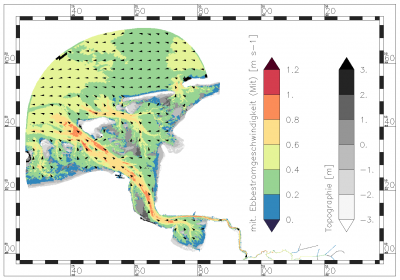Example figures: mean ebb current velocity: Difference between revisions
From BAWiki
imported>Lang Guenther →Closely related quantities: text added |
imported>Lang Guenther →Examples: text added |
||
| Line 23: | Line 23: | ||
|} | |} | ||
<br /> | <br /> | ||
Remark: Magnitude corresponds to the mean value of all ebb current velocity magnitudes. Direction gives mean flow direction during ebb current. Mean ebb current velocity is always larger or equal than [[Example figures: residual ebb current velocity|residual ebb current velocity]]. | |||
=Closely related quantities= | =Closely related quantities= | ||
Revision as of 14:24, 20 August 2014
Explanations
- left top: value of characteristic number for a single event.
- left bottom: mean value of the characteristic number within the period of data analysis.
- right top: maximum value of the characteristic number within the period of data analysis.
- right bottom: minimum value of the characteristic number within the period of data analysis.
Remark: The mean value is only computed at locations where all events have occurred within the period of data analysis.
Examples
| mean ebb current velocity | mean ebb current velocity (maximum) |
|---|---|
 |
 |
Remark: Magnitude corresponds to the mean value of all ebb current velocity magnitudes. Direction gives mean flow direction during ebb current. Mean ebb current velocity is always larger or equal than residual ebb current velocity.
- mean flood current velocity
- maximum ebb current velocity
- residual ebb current velocity (from vector addition)
- mean ebb current : mean tide current


